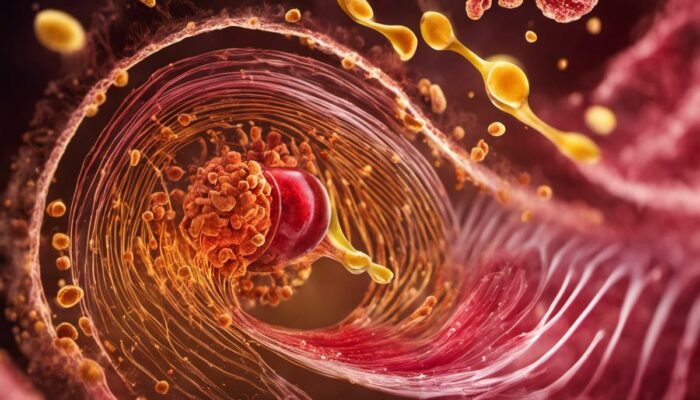Stomach acid, though often demonized, plays an instrumental role in our overall health, performing crucial tasks such as breaking down proteins, sterilizing our food from bacteria, and supporting the absorption of nutrients. However, the significance of having a well-balanced stomach acid level is frequently overlooked!
Too little stomach acid, also known as Hypochlorhydria, can prompt a spectrum of uncomfortable symptoms and potentially jeopardize long-term health. From chronic bloating to skin problems, having low stomach acid is not something one should overlook.
Exactly why It is essential to understand this widely misunderstood component of digestive health. Equipped with this knowledge, we can explore a plethora of Natural Remedies to Heal Low Stomach Acid and enhance our health and well-being. By tackling this problem head-on we can not only look to resolve ill health but also we can improve energy levels and our daily activity.
If you would like to learn more then please keep on reading…
Natural Remedies to Heal Low Stomach Acid
Getting straight to the point here, Natural Remedies for Low Stomach Acid levels are numerous that you can try. Of course, there are many that I most certainly (I think) will not include in this article but some popular ones that we can take a look at are;
1.) Apple Cider Vinegar: An acidic solution that can help increase the stomach’s acidity. Mixing one to two teaspoons in a glass of water before meals can assist in bolstering the stomach’s acid levels.
2.) Ginger: This is another that including in one’s diet can also help, by promoting gastric acid production. Ginger tea, particularly before meals, stimulates digestion and increases acid production.
*Note: The Ginger Tea Teabags I’ve tried, in my experience, are horrible. A good way to do this is to get some fresh ginger root, grate it, and put it in a tea strainer.
If you can get any Pu’er Tea this is a good Ingredient to add alongside honey.
3.) A Protein-Rich Diet: This can help stimulate stomach acid production as proteins are the primary trigger for stomach acid secretion. Consuming smaller meals more frequently can also allow for better and more efficient digestion.
4.) Consuming Bitter Herbs: These are believed to signal the stomach to produce more acid,
5.) Incorporating Probiotics into your diet: This helps support a healthy gut which of course is itself very beneficial.
It is also advisable to avoid drinking water during meals as this can dilute stomach acid, making digestion more difficult.
Understanding Stomach Acid and Its Function
Stomach acid, medically referred to as gastric acid, plays a crucial role in the digestive process. Primarily composed of Hydrochloric Acid (HCl), potassium chloride, and sodium chloride, this potent acid forms in the stomach lining. Gastric acid’s primary function is to break down proteins by separating their amino acid chains for easier digestion.
Regulating the Stomach’s pH Level
Typically between 1.5 and 3.5, is a delicate balancing act. Any imbalance can lead to either too low acidity, hypochlorhydria, or too high acidity, hyperchlorhydria. Both conditions can lead to various gastrointestinal troubles. The low acidity allows bacteria and other pathogens in food to fester as the acid cannot efficiently kill them, leading to potential infections and diseases.
However, It’s Worth Noting
Apart from breaking down proteins, stomach acid facilitates the absorption of other key nutrients such as Vitamin B12, Magnesium, and Zinc. As such, low stomach acid levels can lead to deficiencies and related health issues.
Low Stomach Acid and Potential Health Risks
Low stomach acid, although not as commonly discussed as high acidity, poses significant health risks. The inefficient digestion of proteins can aggravate malnutrition issues due to the compromised absorption of nutrients.
Additionally, it can lead to gastrointestinal infections as the low-acid environment allows harmful bacteria to multiply.
Individuals with chronically low stomach acid may also present symptoms like bloating, belching, heartburn, diarrhea, or constipation. The condition can also trigger food allergies and reduce resistance to food-borne pathogens.
To conclude
While the discussion around low stomach acid, or hypochlorhydria, is limited, its impact on our well-being can be significant. Thankfully, a variety of natural solutions can aid in managing and lessening the effects of this condition. Nevertheless, it’s vital to seek advice from health experts before starting any regime or dietary changes aimed at altering stomach acid levels.
Signs and Symptoms of Low Stomach Acid
The detection of hypochlorhydria, also known as low stomach acid, can often be complex as its symptoms are like those of high stomach acid or other digestive problems. However, there are a number of noticeable warning indications that can assist with identifying this condition. These can Include;
I.) Heartburn
Although heartburn is usually associated with excessive stomach acid, it could also be a product of low stomach acid. This seemingly paradoxical situation develops when the Lower Esophageal Sphincter (LES) – the valve that prevents stomach contents from moving into the oesophageal tube – loses its tonicity, allowing acid to reflux into the esophagus, thus causing burning sensations colloquially known as heartburn.
II.) Bloating
Bloating is another sign of low stomach acid. As stomach acid is pivotal in the breakdown of food, a lack thereof can result in food being broken down by fermentation rather than digestion, which brings about bloating and gassiness.
III.) Indigestion
Low stomach acid can lead to indigestion, as adequate stomach is required for the initial stage of digestion. Indigestion is primarily characterized by a feeling of discomfort in the stomach or difficulty in digesting food. The absence of sufficient stomach acid to break down food particles leads to considerable pressure being exerted on the digestive system, causing indigestion.
III.) Skin Problems
Those susceptible to skin problems like rosacea, acne, or eczema may notice a correlation between skin flare-ups and digestive issues. The reason is that low levels of stomach acid can hinder the body’s capacity to absorb key nutrients required for healthy skin such as collagen, and hyaluronic acid.
IV.) Undigested Food in Stools
The presence of undigested food in stools is another tell-tale sign of low stomach acid. A lack of sufficient stomach acid results in inadequately digested food particles passing into the intestines, which are then expelled via the stool.
Thus, if you notice undigested food particles in your stool frequently, it’s a clear sign that you might be dealing with low stomach acid.
Natural Remedies to Boost Low Stomach Acid
If you are wrestling with low stomach acid, don’t worry, numerous natural remedies can help you boost your stomach acid production. Take, for example, Apple cider vinegar. ACV’s high level of acidity makes it a perfect natural remedy. Consuming a tablespoon before meals can aid your digestion.
Likewise, warm tea, made from ginger, lemon and honey, is renowned for its ability to heighten stomach acidity. Consuming a diet crammed with fruits, green vegetables and lean proteins is also incredibly beneficial for improving acid production.
Additionally, stress reduction and keeping up with regular physical workouts can add more value, as both are known contributors to increasing stomach acid levels. However, it’s of paramount importance to converse with a healthcare professional before adapting to any new diet.
But bear in mind, that these remedies might not work for everyone. Hence, it’s vital for individuals to be observant of their body’s responses and promptly seek a medical professional’s advice should symptoms continue.
Common Causes of Low Stomach Acid
Typical Causes of Low Stomach Acid
Low stomach acid, also known as hypochlorhydria, is a frequently disregarded issue that is connected to various health issues. The causes range broadly. The most significant of them is age: as we grow older, our bodies naturally manufacture less stomach acid. This becomes noticeably evident as over half the population witnesses a decline in stomach acid levels by their fifties.
The next leading cause is prolonged stress. Chronically high-stress levels interfere with a number of our body’s physiological processes, including the generation of stomach acid. In contrast, when our body is in a ‘fight or flight’ stress state, it’s not set up for digestion.
Consequently, stomach acid production can be drastically diminished during periods of high stress.
Your dietary habits also play a major role. Regularly consuming processed foods, sugars, and unhealthy fats can bring about lower stomach acid levels. A nutritious diet, filled with fresh fruits, vegetables, lean proteins, and quality fats, is typically associated with higher stomach acid levels.
Certain medications can also induce low levels of stomach acid. This includes certain types of antacids, proton pump inhibitors, H2 blockers, and other medicines that are used to treat gastroesophageal reflux disease (GERD). These drugs work by cutting down the production of stomach acid, which can lead to hypochlorhydria if used over a long period of time.
Lastly, a variety of underlying health conditions can lead to low stomach acid. This includes conditions such as Helicobacter pylori (H. pylori) infection, atrophic gastritis, autoimmune conditions, or specific surgical procedures that impact the stomach’s acid-producing cells.
Consequences of Long-Term Low Stomach Acid
Long-term low stomach acid could have significant implications on the overall health status. As part of the digestive process, stomach acid plays an essential role in protein digestion by activating pepsin, a protein-digesting enzyme. Low levels of stomach acid could potentially lead to inadequate protein digestion, thereby causing nutrition deficiency.
Lower stomach acid levels can also increase the risk of bacterial overgrowth in the stomach and intestines. This is because a principal function of stomach acid is to sterilize your food and prevent harmful bacteria from entering your gut.
Furthermore, it can inhibit the proper absorption of vital nutrients. Stomach acid is necessary to absorb nutrients like vitamin B12, magnesium, calcium, iron, and zinc. Without adequate levels of stomach acid, these and other nutrients are not absorbed optimally, which can lead to deficiencies.
Boosting Stomach Acid Levels Using Natural Remedies
A variety of natural remedies are available to help support an increase in stomach acid levels. Consuming a diet that is well-balanced, consisting predominantly of whole foods, notably enzyme-rich fruits and vegetables can assist digestion and help raise stomach acid levels.
Additionally, fermented foods such as kimchi, sauerkraut, yogurt, and kefir can introduce favorable bacteria into the gut, promoting more efficient digestion and possibly increasing stomach acid production.
Another traditional remedy often utilized is apple cider vinegar. It is thought to simulate the acidic environment within the stomach, thereby assisting digestion. Similarly, adopting mindful eating practices such as eating slowly and chewing thoroughly can also be highly effective.
Swift eating often leads to swallowing air, which can amplify symptoms of low stomach acid. Chewing food until it is suitably mashed stimulates the release of digestive enzymes, which in turn triggers stomach acid production.
Managing stress through relaxation techniques like yoga, meditation, and breathwork and ensuring sufficient sleep can also help maintain optimum stomach acid levels by reducing the stress response. All these elements combined can significantly contribute to maintaining healthy stomach acid levels naturally.
However, it’s important to bear in mind that every individual’s body is unique, and what may work for one person may not be effective for another. Always seek professional healthcare advice before embarking on any new health-oriented changes.
Natural Remedies for Low Stomach Acid
Unpacking the Concept of Low Stomach Acid
Low stomach acid, also medically termed as hypochlorhydria, refers to insufficient production of hydrochloric acid in the stomach. This lack of acid often results in digestive discomfort including indigestion, bloating, heartburn, and nutritional deficiencies. Common causes of low stomach acid encompass ageing, stress, poor dietary habits, overuse of antacids, and long-term use of certain medications.
Dietary Changes
Alteration in food habits is the primary approach towards remedying low stomach acid. Including bitter and fermented foods in the diet can help stimulate the stomach’s production of acid. Foods like apple cider vinegar, lemon or lime juice, raw salads, pickles, and sauerkraut can be included. Moreover, consuming protein-rich meals can also trigger the production of stomach acid. It is equally vital to chew the food thoroughly to improve digestion.
Hydration
Drinking warm water before meals can aid digestion by warming the stomach and making it more adept at breaking down food. However, it is essential not to drink too much water during meals, as it can dilute stomach acid and impair digestion.
Herbs and Spices
Certain herbs and spices can naturally increase stomach acid. Ginger has been used for centuries to aid digestion and reduce stomach upset. Cinnamon, cardamom, and cloves have high amounts of antioxidants and can stimulate the production of digestive enzymes, aiding in the digestion process. Caraway and dill are other examples of herbs that can help to improve stomach acid levels.
Supplementation
While diet and lifestyle changes can be effective, sometimes supplements can help. Digestive enzymes can improve digestion and absorption of nutrients. Betaine hydrochloride supplements can also increase the production of stomach acid. However, these should only be taken under medical supervision.
Physical Activity
Moderate regular physical activity can improve digestion by stimulating the intestines. Walking after meals is an easy way to encourage movement through the digestive tract.
Reducing Stress Levels
Stress reduction is a key component in increasing stomach acid naturally. High-stress levels can affect digestion and inhibit the production of stomach acid. Incorporating stress-reducing activities like yoga, meditation, and deep-breathing exercises can be beneficial.
Better Sleep Habits
Adequate sleep is equally essential for the optimal functioning of the digestive system. Lack of sleep can impair the body’s ability to produce stomach acid. Therefore, ensuring a consistent sleep schedule and promoting quality sleep through good nighttime habits can promote a healthier stomach environment.
Limit Use of Antacids
Long-term use of antacids can decrease the stomach’s natural ability to produce acid. While temporary relief from symptoms may be beneficial, it’s essential to find a more sustainable solution to manage low stomach acid.
Consultation
Approaching health concerns takes a personalised touch as everyone’s body differs immensely, and a solution that suits one individual may not necessarily be effective for another. Thus, it is strongly recommended to seek advice from a healthcare professional prior to embarking on significant changes in your diet or medication routine.

Consulting a Healthcare Professional
Seeking Professional Healthcare Advice
Effectively managing persistent symptoms, potentially indicative of low stomach acid levels, emphasizes the need for a professionally informed approach. Even though numerous natural remedies are reputed to alleviate the issue, self-medication without proper guidance could present unforeseen risks.
As such, despite the natural propensity to tackle the issue independently, it’s always prudent to pursue medical assistance if symptoms persist.
Healthcare professionals are skilled in accurately identifying the root cause of the symptoms – be it low stomach acid or another underlying health issue. This informed diagnosis considers comprehensive medical examinations, the patient’s health history, reported symptoms and occasionally, certain tests.
Due to striking similarities in the discomfort they produce, symptoms of low stomach acid are frequently misconstrued as those of high stomach acid. Such possible misinterpretation could lead to inappropriate or ineffective treatment measures.
Possible medical treatments for low stomach acid
Once a healthcare professional confirms the diagnosis of low stomach acid, they may go on to recommend several medical treatments. These treatments could include medications, dietary changes, and even certain procedures designed to alleviate the discomfort.
Pharmaceutical methods encompass medications like hydrochloric acid (HCL) supplements, which potentially increase the levels of stomach acid, and pepsin supplements to assist protein digestion.
In addition, there exist proton pump inhibitors (PPIs), which are medications designed to lower the stomach’s acid production. However, it’s worth noting that thorough discussion and understanding of their potential effects is crucial, as some of these medications are also employed to treat high levels of stomach acid.
Dietary changes might entail adopting healthy eating habits and making certain modifications in one’s diet. This could involve avoiding foods that may lower stomach acid levels, including excessively spicy food, caffeine, and alcohol.
The Risks Associated with Self-medication
Engaging in self-medication can be risky for a number of reasons. Firstly, the improper interpretation of symptoms may again lead to wrong medication or consumption of inappropriate quantities. Self-administration of medication might also result in untoward side effects or adverse drug interactions, particularly if multiple supplements or medications are in play.
Then, there’s the possibility of misdiagnosing the ailment as low stomach acid when in fact it could be something altogether different, irrespective of similar symptoms. Self-diagnosing and self-treating as such could delay appropriate treatment and potentially exacerbate the issue.
Lastly, the belief that natural remedies are automatically safer is a misnomer and can be misleading. All substances, nearly natural or artificial, have the potential to cause adverse reactions or perform contrary to expectation. It’s, therefore, paramount to exercise caution when choosing to employ them, and better still to seek professional advice beforehand to ensure suitability.

In Conclusion
While various natural remedies might improve stomach acid levels, it is vital not to ignore persistent symptoms. Recognizing when professional intervention is needed is just as crucial as understanding the problem and knowing feasible solutions.
Medical treatments are available and can provide relief where dietary and lifestyle changes might fail to make a significant impact. Remember, unchecked low stomach acid may have serious consequences on a person’s health, so if symptoms persist, please seek advice from a healthcare professional.
The path to better digestive health is not only about consuming the right foods but also about knowing when to ask for expert guidance.
I will finish up this article here but if you would like to read more check out our IBS and IBD page HERE<<




Anxiety and Depression best ways to lower blood sugar BiOptimizers blood pressure supplements blood sugar support supplements Digestive Enzymes Supplement digital products Dr Sam Robbins Erectile dysfunction Exercise Gut Health Healthy Living heart health HFL how to lower blood sugar levels How To Lower Cholesterol insulin resistance joint health supplement Keto keto dieting Keto Diet Weight Loss leaky gut supplements leptin resistance list Magnesium deficiency Matt Gallant mental health multivitamins Nootropics nutrient supplements Probiotics Probiotic Supplements proteolytic enzymes reverse type 2 diabetes stress and anxiety stress relief vitabalance vitapost Wade Lightheart weight loss articles weight loss diet plans weight loss product reviews weight loss supplements weight loss supplements that work weight loss tea